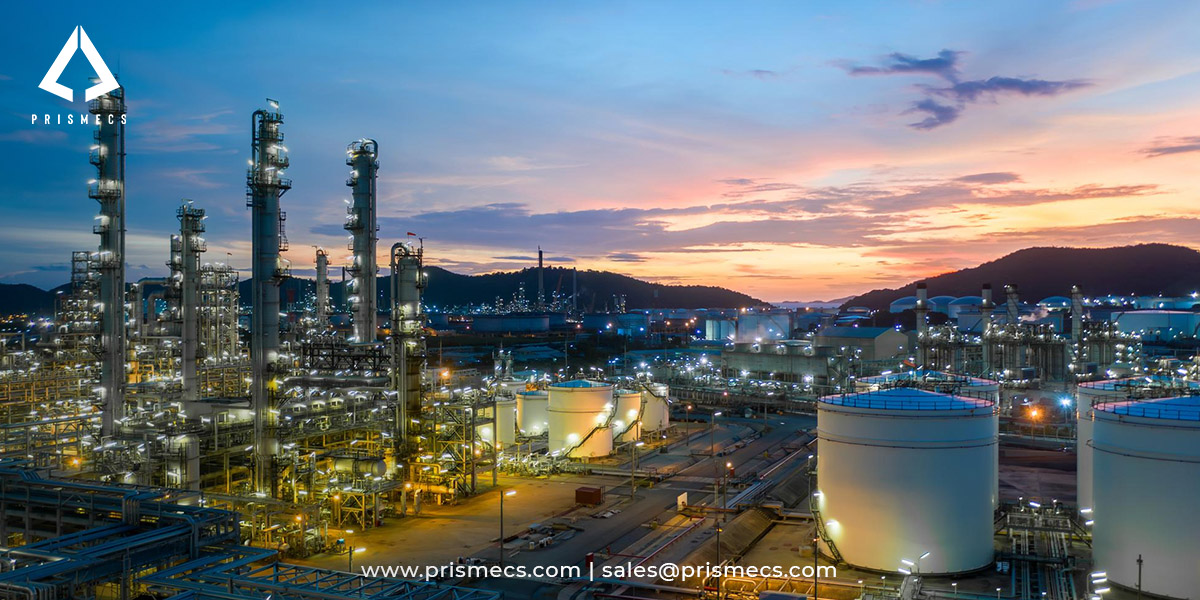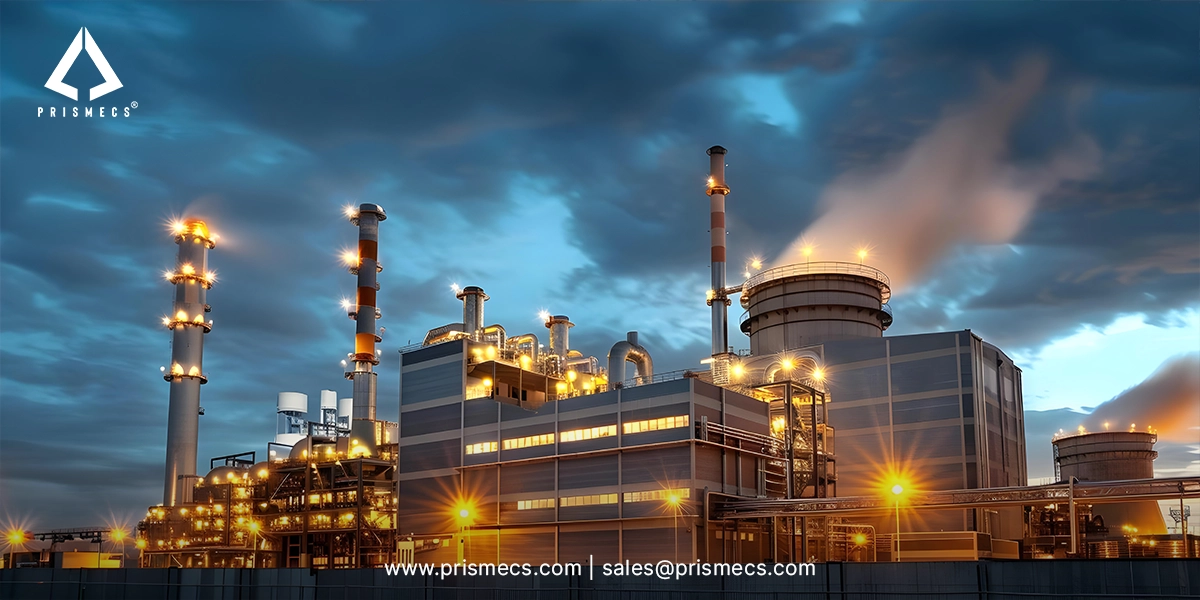
Petrochemicals sit at the core of modern industrial production, forming the material and operational backbone of manufacturing ecosystems worldwide. Beyond their role as raw materials, petrochemical operations depend on continuous, high-reliability energy systems to sustain production, maintain safety standards, and protect asset integrity.
From refineries and chemical processing plants to downstream manufacturing facilities, petrochemical production environments are energy-intensive, mission-critical, and highly sensitive to power disruption. Any instability in energy supply can result in unplanned shutdowns, safety risks, and significant financial losses.
As global manufacturing scales and production cycles tighten, petrochemical operators increasingly require robust, resilient power infrastructure designed not just for output, but for uptime, flexibility, and long-term operational performance.
The Foundation of Petrochemicals
These chemical products are derived from petroleum and natural gas. These substances are fundamental to creating countless products, from everyday consumer goods to complex industrial components.
This vast industry encompasses numerous facilities dedicated to transforming raw hydrocarbons into valuable chemicals. These facilities, typically near oil and gas extraction sites, process crude oil and natural gas to produce essential products.
Role of Petrochemicals in Clean Energy Infrastructure
Petrochemicals play a critical, often overlooked role in enabling modern clean energy infrastructure. From advanced composite materials used in wind turbine blades to high-performance coatings, lubricants, and insulation systems, petrochemical-based products support the durability, efficiency, and long-term reliability of renewable energy assets. These materials directly support Renewable Energy initiatives and distributed power solutions implemented through Prismecs’ Distributed Energy Solutions.
Beyond materials, petrochemical facilities themselves are increasingly integrated into the clean energy transition through hybrid power systems that combine gas-based generation, renewable energy sources, and energy storage. These configurations allow operators to maintain continuous production while reducing exposure to grid instability and supporting decarbonization objectives.
As renewable energy capacity expands, the focus is shifting from generation alone to system performance and uptime. Reliable power delivery, grid synchronization, and lifecycle optimization have become operational priorities requiring engineering expertise that bridges conventional energy systems with emerging clean technologies. For petrochemical operators, success in the energy transition depends on power solutions that are engineered for resilience, flexibility, and long-term operational reliability.
Energy Demand Dynamics Inside Petrochemical Facilities
Petrochemical facilities operate under complex energy demand profiles driven by continuous processing, high thermal loads, and precision-controlled environments. While crude oil and natural gas remain foundational feedstocks, the reliability, efficiency, and adaptability of on-site and grid-connected power systems increasingly define operational success.
As energy markets evolve and demand patterns shift globally, petrochemical operators face mounting pressure to:
- Stabilize power availability
- Integrate flexible generation sources
- Reduce exposure to grid volatility
This has accelerated demand for hybrid power architectures, including gas-based generation, distributed energy solutions, and energy storage systems particularly in regions with constrained or unreliable grid infrastructure.
Operational Challenges and Infrastructure Opportunities in Petrochemicals
The petrochemical sector operates under some of the most demanding industrial conditions, where unplanned downtime, power instability, or equipment failure can result in significant safety, environmental, and financial consequences. As energy systems evolve, operators face growing pressure to modernize infrastructure while maintaining uninterrupted production.
Key challenges include managing energy-intensive processes, integrating new power technologies into legacy facilities, and meeting increasingly stringent environmental and regulatory requirements. These challenges are compounded in regions with constrained grid capacity or aging infrastructure, where power reliability becomes a critical operational risk.
At the same time, these pressures present clear opportunities. Advances in distributed generation, energy storage, digital monitoring, and predictive maintenance are enabling petrochemical facilities to improve efficiency, enhance reliability, and extend asset life. Successfully capturing these benefits requires deep coordination between engineering, procurement, installation, commissioning, and long-term operations.
For petrochemical operators, the path forward is not defined by technology alone, but by the ability to execute complex energy solutions across the full project lifecycle balancing performance, resilience, and sustainability without compromising production continuity.
Petrochemical Market Growth and Infrastructure Implications
The global petrochemical market is projected to reach $691 billion by 2030, growing at 4.6% annually. While North America remains the largest current market, Asia-Pacific is expected to experience the fastest expansion, driven by new products, strategic mergers, and supportive regulations.
For petrochemical operators, this market growth translates directly into new facility construction, plant expansions, and modernization projects all of which demand reliable, scalable, and high-performance energy infrastructure. Expanding capacity without robust power systems can lead to unplanned downtime, reduced production efficiency, and safety risks, highlighting the critical role of integrated energy solutions.
Regions with rapid industrial growth are increasingly investing in:
- Fast-track EPC and commissioning for new plants
- Distributed energy solutions and backup generation to secure continuous production
- Operations and maintenance strategies that maximize uptime and asset life
By linking market growth to operational requirements, this section positions Prismecs as a strategic partner capable of supporting petrochemical operators with end-to-end energy solutions, from planning and installation to long-term O&M and performance optimization.
Power Reliability as a Manufacturing Enabler
Petrochemical operations serve as critical nodes within global manufacturing supply chains, supplying materials essential to sectors ranging from automotive and electronics to construction and energy. The performance of these supply chains is directly linked to plant reliability and uninterrupted production.
Power disruptions at petrochemical facilities can cascade across multiple industries, amplifying downtime, delaying deliveries, and increasing operational risk. As a result, manufacturers and asset owners increasingly prioritize:
- Redundant power systems
- Predictive maintenance strategies
- Integrated energy and operational planning
Reliable power infrastructure is no longer a support function, it is a strategic enabler of manufacturing continuity and economic stability.
The Future of Petrochemicals
The petrochemical industry must adapt to meet new demands for cleaner energy sources while addressing environmental concerns. Renewable energy technologies and sustainable alternatives will shape the industry's future.
This will continue to drive global manufacturing and production by providing essential materials. While the shift towards clean energy presents challenges, it also opens opportunities for innovation and growth within the industry. The benefits of petrochemicals with the need for sustainability will be key to achieving a more sustainable future.
Conclusive Remarks
Petrochemicals are essential to global manufacturing and production. They provide the raw materials for a wide range of products and processes. As the industry navigates challenges related to sustainability and the energy transition, it remains a key driver of economic growth and innovation.
By embracing new technologies and sustainable practices, the industry can continue to support global manufacturing while addressing the evolving needs of society. To succeed in the petrochemical market, businesses must partner with industry leaders and stay informed about trends and innovations. This will help them navigate the market's complexities and leverage its potential.
How Prismecs Can Help Drive Growth in the Petrochemicals Sector
As the petrochemical industry undergoes significant growth and transformation, Prismecs emerges as a key partner in driving innovation. Our expertise in integrating advanced technologies and sustainable practices enables us to help petrochemical companies address challenges and capitalize on new opportunities
Prismecs empowers businesses to enhance active efficiency, streamline processes, and foster innovation. We advance this sector by providing customized strategies and solutions that align with market demands. Partner with Prismecs to navigate the complexities of the industry and unlock new pathways for growth and success. To avail of our services, call us at +1(888) 774-7632 or email us at sales@prismecs.com
Frequently Asked Questions (FAQs)
1. What role do petrochemicals play in global manufacturing?
Petrochemicals provide essential raw materials used in the production of countless products, from consumer goods to industrial components.
2. How do petrochemicals impact the clean energy sector?
Petrochemicals are crucial in producing materials for renewable energy technologies, such as wind turbines and solar panels.
3. What challenges does the petrochemical industry face in the current energy transition?
The petrochemical industry faces challenges related to environmental sustainability, such as reducing greenhouse gas emissions and minimizing the carbon footprint of production processes.
4. How does the demand for petrochemicals relate to global oil consumption?
The demand for petrochemicals is closely related to global oil and gas consumption. Crude oil and natural gas are the main raw materials for petrochemical production.
5. What is the perspective of the petrochemical industry?
The future of the petrochemical industry involves adapting to the growing emphasis on sustainability and clean energy.
Tags: Petrochemical Chemicals Industry Energy Manufacturing Hydrocarbons Refining Polymer Plastics Resins Fuels Additives Synthetics Industrial Resources
recent posts

Power Generation
10 minutes read
How to Maximize Uptime in Power Generation Plants
Discover how Prismecs power plant maintenance helps operators prevent outages, protect revenue, and keep turbines running at peak performance. Learn h...

Renewables
8 minutes read
Opportunities in Renewable Energy Development
Explore Renewable Energy Development strategies focused on grid stability, faster deployment, and resilient power systems with Prismecs. Plan your nex...

Press Release
2 minutes read
Altaaqa Global & Prismecs Form Strategic Cooperation to Accelerate Modular Power Deployment Across USA
Prismecs and Altaaqa Global Announce Strategic Cooperation to Accelerate Modular Power Deployment in the United States Houston, TX & Dubai, UAE – Febr...

Procurement
9 minutes read
Complete Guide to Industrial Procurement Services
Explore Industrial Procurement Services for power and oil & gas projects. Cut delays, secure critical equipment, and build resilient supply chains wit...